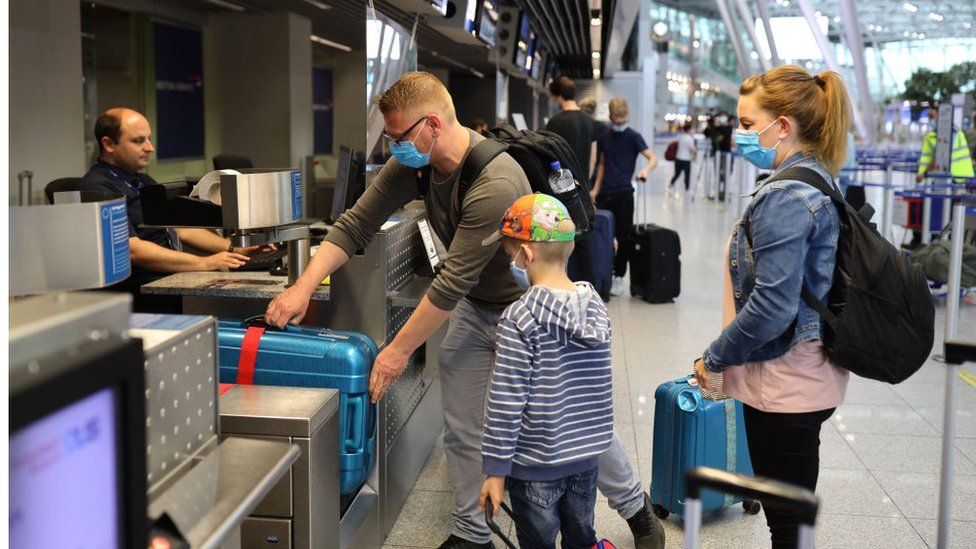Tui boss: UK falling behind European travel recovery
- Published
- comments

The UK holiday recovery is lagging behind the rest of Europe, in part due to uncertainty over shifting Covid travel restrictions, Europe's biggest travel firm has said.
Tui bookings have jumped by 1.5 million since May, primarily driven by bookings from continental Europe.
But the holiday firm said frequent UK rule changes had deterred people.
The UK government said that its "top priority is to protect public health".
Tui chief executive Friedrich Joussen said British holidaymakers had faced more uncertainty than many other Europeans in recent months and had been put off by changing policies from the UK government.
He pointed out the UK decision to add Portugal to the list of green travel destinations in mid-May before removing it in early June.
"When you change the programme so often, then people cancel," he added.
The cost of PCR tests for Covid would also be putting off customers, he said.
Since mid-January, on all but a few days, UK travellers cancelled more travel for summer 2021 than they booked, according to Tui data.
This is in direct contrast to customers from Germany, Belgium and the Netherlands, where bookings were ahead of cancellations for most of that period.
Booking trends
Despite a jump in summer interest, total Tui bookings were still down 68% compared with summer 2019.
Tui said that about 4.2 million customers had booked for summer 2021, with an increase of 1.5 million bookings since May.
The travel firm said pent-up demand from European holidaymakers was behind the rise.
But while UK bookings are picking up, they are still lagging behind other countries.
UK customers are normally a major part of Tui's business, but only about 17% of those 4.2 million summer customers were from the UK.
In the third quarter, only 50,000 customers departed from Tui's northern region, composed of the UK and Ireland, the Nordic countries, Canada and Russia.
This reflected "limited green list destinations made available by the UK government" and the "stop-start nature of permitted destinations under UK travel restrictions", Tui added.
The next UK travel list review is due on or about 25 August.
'Not confident to book'
Travel expert Simon Calder said: "The simple reason bookings are so sluggish in the UK is the unpredictability of government advice."
He added: "I am hearing from a lot of prospective travellers that they are not confident enough to book - and from many of those with bookings that they wish they hadn't committed."
The UK government has a "traffic light" system in place for international travels, with green, amber and red list countries.
This week, it updated the list, with France moving from "amber-plus" status to normal amber country rules.
Most countries are on the amber list, with adults that have been fully vaccinated in the UK, US and most European countries not having to self-isolate upon arrival in the UK.
The UK government has previously said that while it wants people to be able to travel, the travel lists are updated "to protect us against new variants" of Covid.
A Department for Transport spokesperson said: "Our top priority is to protect public health - decisions on our traffic light system are kept under regular review and are informed by the latest risk assessment from the Joint Biosecurity Centre and wider public health factors.
"We recognise the challenging times facing the travel sector, which is why we have committed around £7bn of support by September 2021 and continue to work with industry to help them navigate this difficult period.
"Travel continues to be different this year and we encourage people to always check [Foreign Office] travel advice before travelling as any trip carries an increased risk."
Travel firm woes
Tui and many other firms in the travel sector have been hit very hard by the effects of coronavirus.
The travel firm, which has its headquarters in Hanover, has had a number of bailouts from the German government and loans worth billions of euros.
Because of Brexit, its credit line from a British bank could not be extended beyond summer 2022.
- Published11 February 2022
- Published5 August 2021
- Published5 August 2021